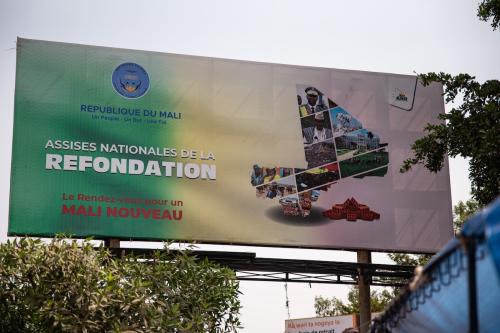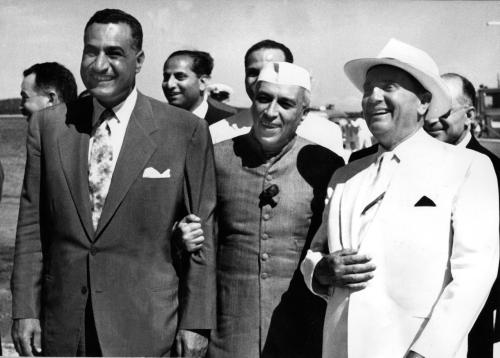From August 24 to 28, President of Zimbabwe Robert Mugabe, the only Southern African leader not invited to the U.S.-Africa Leaders Summit, is paying a state visit to China at the invitation of Chinese President Xi Jinping. While Mugabe has visited China more than a dozen times in the past, this is his first trip to the Middle Kingdom after the victory in the July 2013 general elections. While Mugabe’s interest in currying favors with China is clear, many find it difficult to understand why President Xi would invite the controversial Zimbabwean leader for a formal state visit that has both political and symbolic significance.
Indeed, Zimbabwe’s domestic political situation and China’s image as the “only major international supporter of Zimbabwe,” according to some analysts, have, in the past, put China under great international scrutiny, leading to wide criticisms—and even embarrassment for China. Most strikingly, in April 2008, a Chinese cargo ship loaded with armaments for Zimbabwe raised international uproar over China’s support of Mugabe in his suppression of domestic political opposition. Beijing eventually cancelled the deal for fear of the regional and international outrage. Three months later, China paid even heavier political and reputational costs when it vetoed a U.N. Security Council resolution to impose sanctions against Mugabe for rigging the elections and then the ensuing violence. This further instigated broad rage from the international community about China’s “shielding” of the Zimbabwean dictator.
The controversies and bad PR for China have led Beijing to adopt a low-key and prudent approach in dealing with Harare. Top Chinese leaders have avoided visiting the country—the last time a member of the Politburo Standing Committee visited Zimbabwe was in 2007. Both President Hu Jintao and President Xi Jinping avoided Zimbabwe during their tours of Southern Africa in 2007 and 2013, respectively. These moves were rather unusual given the size, location and regional status of Zimbabwe.
Meanwhile, China has been an eager funder/investor in Zimbabwe in the hope that Chinese financing would promote economic development, and, hence, the political stabilization of the country. In 2011, China signed off a $700 million loan to Zimbabwe that focused on agricultural development, machinery, medical care and water systems. The loan was followed by another $150 million to upgrade and expand the Victoria Falls International Airport in 2012, and further reinforced by a $319 million concessional loan for the expansion of Kariba Power Station by the China Exim Bank in 2013. According to Chinese official statistics, Zimbabwe was the No. 1 recipient of Chinese investment among all African countries in 2013.
The perception of improved political and economic conditions in Zimbabwe is a key reason that Xi has extended the invitation for Mugabe to visit despite previous controversies. Unlike in 2008, the 2013 general elections did not result in major disputes, instability or violence in Zimbabwe. In China’s view, the results of the 2013 elections have been accepted by a majority of Zimbabweans and by countries in the region. So, for China, the controversy associated with Mugabe’s status as a “dictator” has now been greatly dispelled.
The improved recognition and support of Mugabe’s legitimacy by African countries and key regional organizations further mitigated China’s sense of vulnerability and concerns. In January 2014, Mugabe was elected the first vice-chair of the influential African Union (AU) Bureau, representing Southern Africa. The appointment also makes him eligible for the AU chairmanship in 2015. Earlier this month, Mugabe was named chairman of the 15-nation Southern African Development Community (SADC), the main political bloc in the region. These outcomes are seen as the region’s endorsement of Mugabe’s “unequivocal winning of the election, contested as it was.” Since countries in the region and regional organizations are endorsing Mugabe and his legitimacy, China certainly does not stand alone or feel as vulnerable as it was a few years ago.
Other than the improved political standing and reputation, as the chair for SADC and first vice-chair of AU, Mugabe also now enjoys great influence over the agendas of its regional organizations. These agendas include the economic transformation of Africa, the establishment of a regional free trade zone, infrastructure development, and regional transportation network, as well as political and security issues. As elaborated by Premier Li Keqiang in his trip to Africa in May 2014, China is keen on participating in these processes and fully exploiting the economic opportunities Africa has to offer, making China an indispensable partner for the continent. China’s agendas have been echoed by Mugabe, who pledged to “discuss infrastructure projects that add value to regional products” with China during his upcoming trip. Under the circumstances, China certainly would not neglect the need to warm up to Mugabe, a key figure with great influence over these regional endeavors.
Traditionally, the China-Africa policy community perceives Mugabe as a “world-famous leader of African national liberation movement,” who has had a long friendship with China and has supported China’s policies through history. The shared “revolutionary and national liberation” credentials between China and Mugabe, along with a sense of mutual support between two “third-world” countries against Western powers have always made Mugabe “an old friend of Chinese people.” Zimbabwe and Mugabe might have been a headache and reputational liability for China in the past few years, but with the improved domestic situation in Zimbabwe, Mugabe’s enhanced legitimacy, the region’s endorsement of him, as well as his rising influence in regional organizations such as AU and SADC, China is eagerly renewing the ties.
The Brookings Institution is committed to quality, independence, and impact.
We are supported by a diverse array of funders. In line with our values and policies, each Brookings publication represents the sole views of its author(s).



Commentary
Mugabe in China: Ties Renewed
August 25, 2014